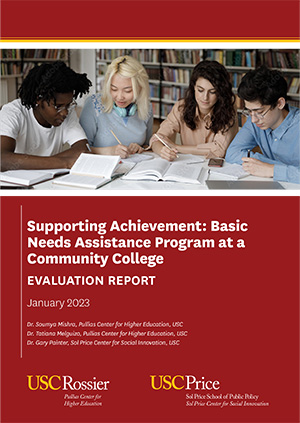USC’s Pullias Center and Sol Price Center for Social Innovation report provides timely evidence that additional funds help students achieve academic goals
A new report from USC’s Pullias Center for Higher Education and the Sol Price Center for Social Innovation suggests that when high-need community college students are provided with additional financial aid, they have stronger academic outcomes than their peers.
The “Supporting Achievement: Basic Needs Assistance Program at a Community College” project aimed to determine if discretionary monthly stipends provided to a cohort of Los Angeles College Promise Program (LACP) students enrolled at a Los Angeles Community College District (LACCD) school would have an impact on their academic goals.
The result? A resounding yes.
The Basic Needs Assistance (BNA) awardees enrolled in the program were first-year students at LACCD’s Southwest Community College. The evaluation suggests that students participating in the BNA Program – which provided students with $4,700 to cover basic living expenses such as food, rent and utilities — had stronger academic outcomes than comparable LACP students in prior years. Positive outcomes included an increase in credits attempted and earned, higher GPAs, as well as a reduction in the number of students working part-time or full-time.
“The inability to cover basic living expenses like housing and food threatens the enrollment and academic performance of many community college students,” said Soumya Mishra, a Pullias Center post-doctoral scholar and one of the report’s authors. “This evaluation finds that providing high-needs students with a monthly stipend can improve their credit accumulation and academic performance.”
The evaluation, generously funded by the Leonetti O’Connell Family Foundation (LOCFF), also found that recipients felt less financial stress than their non-enrolled peers when participating in the BNA program.
This monthly stipend was just one of the features that sets apart the LOCFF evaluation from other programs that offer ‘last-dollar assistance’ to students. The other distinguishing aspect is that the program worked with students and administrators of the LACP to identify and support the students. LACP is an existing academic and enrollment support program designed to provide academic supports and fee waivers to high-need first-time-in college students that commit to staying enrolled full time and maintaining a GPA of 2.0.
“This research suggests that providing cash to a vulnerable student population is associated with positive benefits, including student persistence and reduced stress, that are similar to the results of targeted aid programs,” stated Gary Painter, Director of the Price Center for Social Innovation and one of the report’s authors.
Although the BNA program was limited to first-time-in college students, it served more adult learners (over the age of 20), than the LACP program. The report noted that due to family responsibilities and lack of financial cushion, adult and low-income students are at a greater risk of dropping out of college in the absence of financial supports like the BNA program.
Learn more about the Basic Needs Assistance evaluation by clicking here.








